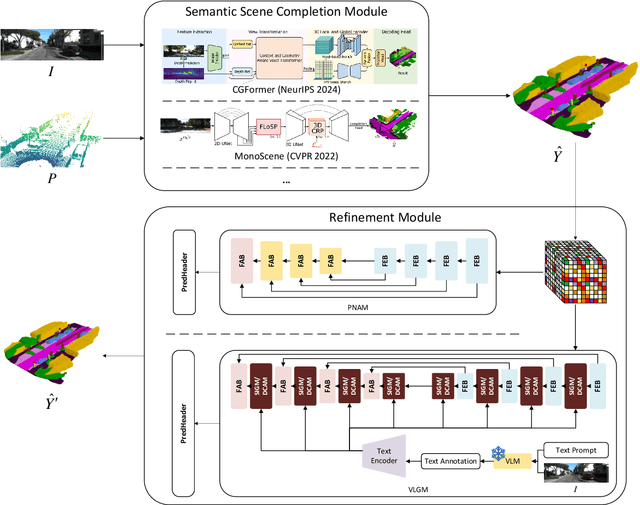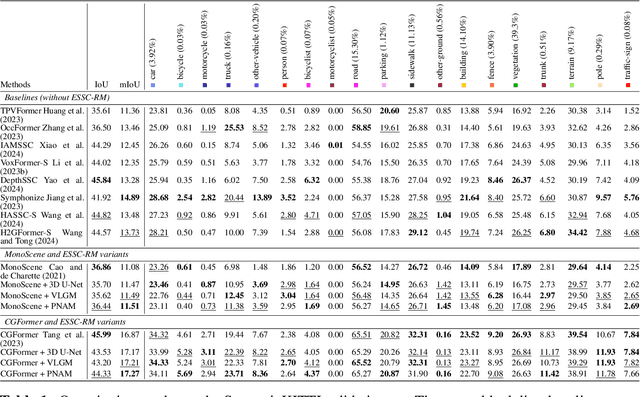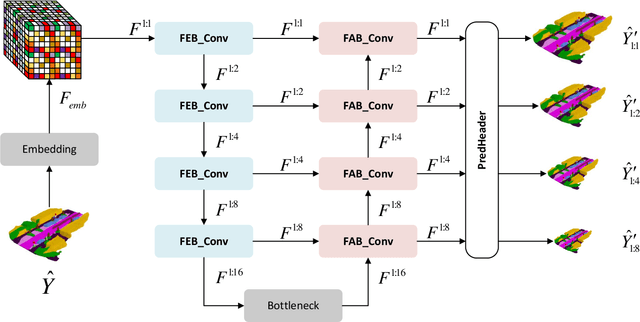Lei Bao
National Science Center for Earthquake Engineering, Tianjin University, Tianjin, China, School of Civil Engineering, Tianjin University, Tianjin, China
Genie Sim 3.0 : A High-Fidelity Comprehensive Simulation Platform for Humanoid Robot
Jan 05, 2026Abstract:The development of robust and generalizable robot learning models is critically contingent upon the availability of large-scale, diverse training data and reliable evaluation benchmarks. Collecting data in the physical world poses prohibitive costs and scalability challenges, and prevailing simulation benchmarks frequently suffer from fragmentation, narrow scope, or insufficient fidelity to enable effective sim-to-real transfer. To address these challenges, we introduce Genie Sim 3.0, a unified simulation platform for robotic manipulation. We present Genie Sim Generator, a large language model (LLM)-powered tool that constructs high-fidelity scenes from natural language instructions. Its principal strength resides in rapid and multi-dimensional generalization, facilitating the synthesis of diverse environments to support scalable data collection and robust policy evaluation. We introduce the first benchmark that pioneers the application of LLM for automated evaluation. It leverages LLM to mass-generate evaluation scenarios and employs Vision-Language Model (VLM) to establish an automated assessment pipeline. We also release an open-source dataset comprising more than 10,000 hours of synthetic data across over 200 tasks. Through systematic experimentation, we validate the robust zero-shot sim-to-real transfer capability of our open-source dataset, demonstrating that synthetic data can server as an effective substitute for real-world data under controlled conditions for scalable policy training. For code and dataset details, please refer to: https://github.com/AgibotTech/genie_sim.
Enhancing 3D Semantic Scene Completion with a Refinement Module
Dec 20, 2025



Abstract:We propose ESSC-RM, a plug-and-play Enhancing framework for Semantic Scene Completion with a Refinement Module, which can be seamlessly integrated into existing SSC models. ESSC-RM operates in two phases: a baseline SSC network first produces a coarse voxel prediction, which is subsequently refined by a 3D U-Net-based Prediction Noise-Aware Module (PNAM) and Voxel-level Local Geometry Module (VLGM) under multiscale supervision. Experiments on SemanticKITTI show that ESSC-RM consistently improves semantic prediction performance. When integrated into CGFormer and MonoScene, the mean IoU increases from 16.87% to 17.27% and from 11.08% to 11.51%, respectively. These results demonstrate that ESSC-RM serves as a general refinement framework applicable to a wide range of SSC models.
Multi-segment Soft Robot Control via Deep Koopman-based Model Predictive Control
May 01, 2025Abstract:Soft robots, compared to regular rigid robots, as their multiple segments with soft materials bring flexibility and compliance, have the advantages of safe interaction and dexterous operation in the environment. However, due to its characteristics of high dimensional, nonlinearity, time-varying nature, and infinite degree of freedom, it has been challenges in achieving precise and dynamic control such as trajectory tracking and position reaching. To address these challenges, we propose a framework of Deep Koopman-based Model Predictive Control (DK-MPC) for handling multi-segment soft robots. We first employ a deep learning approach with sampling data to approximate the Koopman operator, which therefore linearizes the high-dimensional nonlinear dynamics of the soft robots into a finite-dimensional linear representation. Secondly, this linearized model is utilized within a model predictive control framework to compute optimal control inputs that minimize the tracking error between the desired and actual state trajectories. The real-world experiments on the soft robot "Chordata" demonstrate that DK-MPC could achieve high-precision control, showing the potential of DK-MPC for future applications to soft robots.
LLM-Powered Explanations: Unraveling Recommendations Through Subgraph Reasoning
Jun 22, 2024



Abstract:Recommender systems are pivotal in enhancing user experiences across various web applications by analyzing the complicated relationships between users and items. Knowledge graphs(KGs) have been widely used to enhance the performance of recommender systems. However, KGs are known to be noisy and incomplete, which are hard to provide reliable explanations for recommendation results. An explainable recommender system is crucial for the product development and subsequent decision-making. To address these challenges, we introduce a novel recommender that synergies Large Language Models (LLMs) and KGs to enhance the recommendation and provide interpretable results. Specifically, we first harness the power of LLMs to augment KG reconstruction. LLMs comprehend and decompose user reviews into new triples that are added into KG. In this way, we can enrich KGs with explainable paths that express user preferences. To enhance the recommendation on augmented KGs, we introduce a novel subgraph reasoning module that effectively measures the importance of nodes and discovers reasoning for recommendation. Finally, these reasoning paths are fed into the LLMs to generate interpretable explanations of the recommendation results. Our approach significantly enhances both the effectiveness and interpretability of recommender systems, especially in cross-selling scenarios where traditional methods falter. The effectiveness of our approach has been rigorously tested on four open real-world datasets, with our methods demonstrating a superior performance over contemporary state-of-the-art techniques by an average improvement of 12%. The application of our model in a multinational engineering and technology company cross-selling recommendation system further underscores its practical utility and potential to redefine recommendation practices through improved accuracy and user trust.
Adapting Step-size: A Unified Perspective to Analyze and Improve Gradient-based Methods for Adversarial Attacks
Feb 02, 2023



Abstract:Learning adversarial examples can be formulated as an optimization problem of maximizing the loss function with some box-constraints. However, for solving this induced optimization problem, the state-of-the-art gradient-based methods such as FGSM, I-FGSM and MI-FGSM look different from their original methods especially in updating the direction, which makes it difficult to understand them and then leaves some theoretical issues to be addressed in viewpoint of optimization. In this paper, from the perspective of adapting step-size, we provide a unified theoretical interpretation of these gradient-based adversarial learning methods. We show that each of these algorithms is in fact a specific reformulation of their original gradient methods but using the step-size rules with only current gradient information. Motivated by such analysis, we present a broad class of adaptive gradient-based algorithms based on the regular gradient methods, in which the step-size strategy utilizing information of the accumulated gradients is integrated. Such adaptive step-size strategies directly normalize the scale of the gradients rather than use some empirical operations. The important benefit is that convergence for the iterative algorithms is guaranteed and then the whole optimization process can be stabilized. The experiments demonstrate that our AdaI-FGM consistently outperforms I-FGSM and AdaMI-FGM remains competitive with MI-FGSM for black-box attacks.
A Comparison between Network-Controlled Repeaters and Reconfigurable Intelligent Surfaces
Nov 13, 2022



Abstract:Network-controlled repeater (NCR) has been recently considered as a study-item in 3GPP Release 18, and the discussions are continuing in a work-item. In this paper, we introduce the concept of NCRs, as a possible low-complexity device to support for network densification and compare the performance of the NCRs with those achieved by reconfigurable intelligent surfaces (RISs). The results are presented for the cases with different beamforming methods and hardware impairment models of the RIS. Moreover, we introduce the objectives of the 3GPP Release 18 NCR work-item and study the effect of different parameters on the performance of NCR-assisted networks. As we show, with a proper deployment, the presence of NCRs/RISs can improve the network performance considerably.
 Add to Chrome
Add to Chrome Add to Firefox
Add to Firefox Add to Edge
Add to Edge